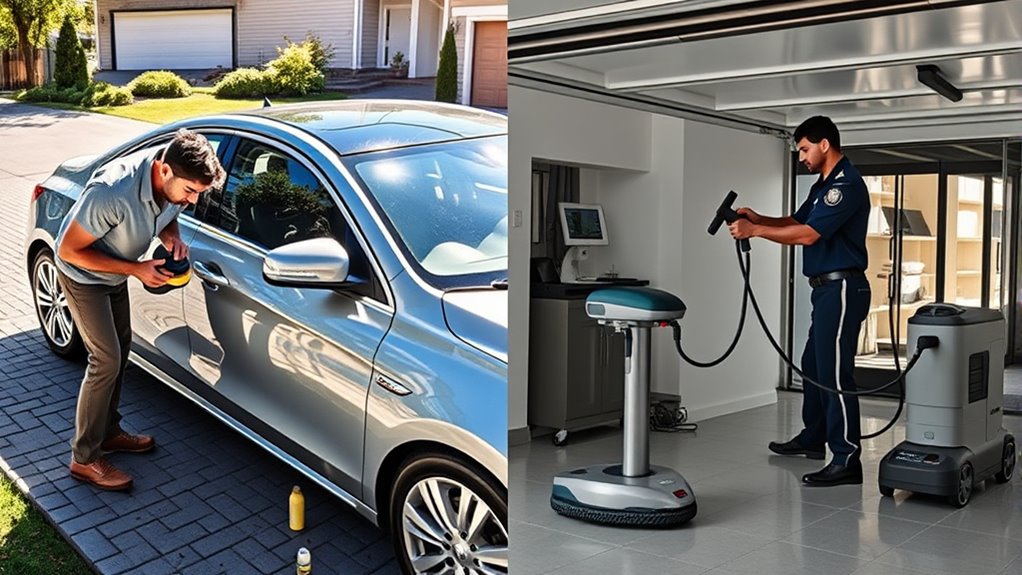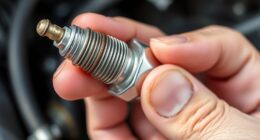If you’re comparing costs, doing your own car care can save money initially since you only buy supplies and use your existing tools, but mistakes could lead to costly repairs. Professional services cost more upfront but offer consistent quality and save you time. Your skill level and how much you value a flawless finish influence the best choice. Keep exploring to discover which option fits your budget and needs best.
Key Takeaways
- DIY car care has lower initial costs but may incur higher long-term expenses due to mistakes or product overuse.
- Professional services involve higher upfront fees but often provide better quality and time savings.
- DIY requires time and skill, which can increase costs if mistakes lead to repairs or damage.
- Routine DIY maintenance is more cost-effective, but specialized treatments may be more economical professionally.
- Overall, DIY saves money initially but professional care offers consistent, high-quality results that can prevent costly repairs.

When it comes to maintaining your vehicle’s appearance and performance, you have two main options: DIY car care or hiring professionals. Deciding between these choices often hinges on a clear understanding of the cost analysis and skill requirements involved. Each approach has its financial benefits and potential pitfalls, so it’s worth weighing them carefully.
Choosing between DIY car care and professional services depends on your budget, skills, and desire for convenience.
If you lean toward DIY car care, your initial costs are usually lower. You’ll need to purchase basic supplies like car wash soap, microfiber towels, wax, and possibly some specialized tools. These expenses can be minimal if you already own some equipment, and many products are affordable. The ongoing costs are also manageable, especially if you prefer doing routine maintenance yourself rather than paying for frequent professional services. However, the cost savings come with a caveat: your skill requirements are relatively high. Properly washing, waxing, or detailing a car demands a certain level of knowledge and technique. If you’re new to these tasks, you might end up using more product than necessary or unintentionally damaging your vehicle’s paint or interior. Mistakes can lead to costly repairs down the line, so your ability to follow instructions carefully and develop good technique plays a vital role in making DIY car care cost-effective.
On the other hand, hiring professionals involves higher upfront costs. Service fees for detailing, washing, or mechanical repairs can quickly add up, especially if you opt for premium packages or frequent visits. But these costs often include expert skill, experience, and specialized equipment you might not have at home. Professionals know how to perform tasks efficiently and correctly, reducing the chances of errors that could damage your vehicle or require costly fixes later. While the initial expense is higher, many car owners find value in the time saved and the quality of work delivered. The skill requirement is essentially off your plate, giving you peace of mind knowing trained experts are handling your vehicle.
Ultimately, your decision rests on your budget, your comfort level with vehicle maintenance, and how much time you’re willing to invest. DIY car care can be budget-friendly if you’re confident in your skills and willing to learn, but it can also lead to higher costs if mistakes happen. Professional services, while more expensive upfront, tend to deliver consistent results without the learning curve, making them a sensible choice if you prioritize quality and convenience.
Frequently Asked Questions
How Do DIY Car Care Costs Vary With Vehicle Type?
Your DIY car care costs vary based on vehicle age and your DIY skill level. Older vehicles often need more parts and maintenance, increasing costs, especially if you’re less experienced. If you’re skilled, you might save money on repairs or upgrades. Newer cars generally require less work. So, your vehicle’s age and your ability to perform tasks influence how much you’ll spend doing DIY maintenance, making costs quite personalized.
Are There Long-Term Savings With Professional Car Maintenance?
Imagine this: professional maintenance maximizes your money’s mileage, fostering long-term savings. With expert care, you benefit from meticulous inspections and precise repairs, boosting cost efficiency and maintenance longevity. While DIY might save money upfront, it risks costly mistakes and missed issues down the line. Investing in professional care pays off over time, preventing pricey repairs and ensuring your vehicle stays reliable and road-ready longer.
What Hidden Costs Are Associated With DIY Car Repairs?
When doing DIY car repairs, you might face unexpected expenses like costly mistakes or damaged parts. Additionally, there’s the initial tool investment, which can be expensive if you’re just starting out. These hidden costs can add up quickly and sometimes surpass the price of professional repairs. You should consider whether the savings are worth the risk of these unforeseen expenses, especially if you’re not experienced.
How Does Labor Quality Impact the Overall Cost Comparison?
Ever wondered how labor quality affects costs? When you focus on labor precision and skill consistency, professional services often deliver better results, reducing the risk of costly mistakes. Although DIY might seem cheaper upfront, inconsistent skill can lead to repairs or rework, increasing expenses. So, you should consider whether investing in professional car care guarantees reliable, high-quality workmanship, ultimately saving you money and time in the long run.
When Should I Prioritize Professional Service Over DIY?
You should prioritize professional service when safety considerations are vital, or when costly mistakes could result from DIY attempts. If the task involves complex repairs or delicate parts, professionals guarantee quality work and reduce risks. While DIY saves money upfront, trusting experts minimizes potential safety hazards and costly errors. When in doubt, investing in professional care protects your vehicle and your safety, making it the smarter choice for essential or complicated jobs.
Conclusion
When it comes to car care costs, think of DIY as a double-edged sword—you save money upfront but might face costly mistakes. Professional services are like a trusted guide, offering expertise that can prevent expensive repairs down the road. Ultimately, weighing your skills and budget is key. Remember, sometimes investing in pros is like planting a seed for long-term savings, ensuring your vehicle stays in top shape without draining your wallet.









